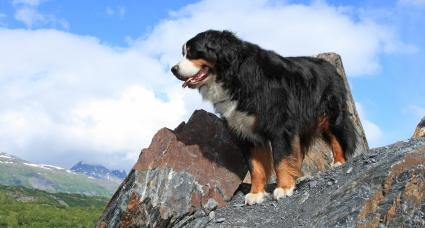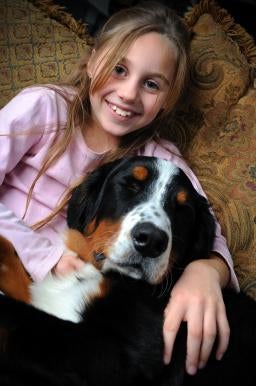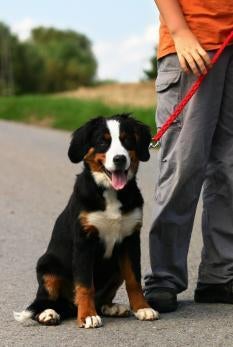Bernese Mountain Dogs They're Big & They're Beautiful
Perhaps you have seen these gentle giants hitched to a small cart and festooned with ribbons, or perhaps you have seen one trotting calmly beside his master. Or maybe you have yet to meet the wonderful Bernese Mountain Dog!
For breed lovers and novices alike the Bernese Mountain Dog makes an excellent companion and playmate. Coming from ancient Roman origins the Bernese is also a dog with a wealth of history. If you love big dogs, but require a gentle and temperate companion who loves children and adults alike, perhaps you should think about making friends with a Bernese Mountain Dog.
Go straight down to Bernese Mountain Dog Training information.

[google_ad:DOTR_CMS_468x60_InArticle1]
Bernese Mountain Dog History
The origins of the Bernese Mountain Dog are not especially well documented, probably because they are an ancient breed. It is thought that the breed began to develop when the Romans came into Switzerland about two-thousand years ago, bringing with them large, mastiff type dogs who eventually evolved into the Bernese Mountain Dog. For thousands of years the breed was used as a general purpose farm dog, until their numbers began to decline around the turn of the 20th century. It was then that some Swiss farmers realized how valuable the breed was, and moved to resuscitate it. These farmers were from the hamlet of Bern, which eventually led to the breed's name (Bernese Mountain Dog). These canine loving farmers began registering and showing their dogs as early as 1902, and the dogs quickly gained admirers on a global scale.Records show that the first pair of Bernese Mountain Dogs was brought into the United States in 1926 by Isaac Scheiss, a Kansas farmer. However, he failed in his quest to register the dogs with the AKC. It wasn't until 1936, when Mr. Glen Shadow imported another pair, that the AKC finally officially recognized the breed.
Appearance Of The Bernese Dog
The Bernese Mountain Dog is an unmistakable breed, with his glossy black coat, white chest and feet, and brown markings on cheeks and eyebrows. In fact, this color standard is very rigid within the breed, and the only acceptable variation is within the amount of white on the dog's chest.The breed is also double coated, which means that the dog has both a soft and downy undercoat as well as a coarse and wiry outer coat. This means that the Bernese is well suited to the cold and snow, and loves to frolic outside in winter conditions. But this also means that the Bernese can easily become overheated in hot weather, and should stay inside on warm days. Also keep in mind that this double coat means a lot of shedding, especially when the seasons turn. If you hate dog hair then the Bernese may not be the right breed for you. The Bernese Mountain Dog is also a large breed, ranging from 85 to 165 pounds and measuring upwards of 2 feet tall at the withers. Make sure you have room both in your heart and your home for such a large dog!
Bernese Mountain Dog Temperament
One of the selling features of the Bernese Mountain Dog is his excellent and gentle temperament. These dogs are known for their sweet and mild nature, and make wonderful family dogs because they are so good around children. Bernese Mountain Dogs are often used as therapy dogs for this very reason. They provide a calm and reassuring presence for people in hospitals and nursing homes, and are quite content to sit and be petted.
They provide a calm and reassuring presence for people in hospitals and nursing homes, and are quite content to sit and be petted.
Of course Bernese Mountain Dogs are very people oriented, which means that the breed does not do well when left alone for long periods of time. Bernese Mountain Dogs want, and need to be wherever their family is. This means that you cannot leave a Bernese in the backyard while you go watch TV; he will quickly become agitated and possibly destructive. Other tendencies of this people-centric breed include leaning and rubbing on family members, and becoming your second shadow. Canine separation anxiety can be a very real and pressing concern with the Bernese breed.
The Bernese Mountain Dog is a moderately active breed. He isn't hyper, but because of his working background he does need some focused daily exercise for about 30 minutes. He also loves the outdoors, and makes an excellent hiking or camping companion.
Bernese Mountain Dogs also get along very well with most other animals, including other dogs and cats. As with any dog though it is important to make sure a puppy is well socialized and exposed to other pets in a positive environment.
[google_ad:DOTR_CMS_468x60_InArticle2]
Bernese Health Issues
Unfortunately the Bernese is not known for being a long-lived breed; his life span usually ranges between 7-12 years, with the oldest Bernese Mountain Dog living until 15 years of age. One of the main health issues Bernese owner's face is a significantly higher risk of cancer. In fact, over half of Bernese Mountain Dogs die from cancer, as compared to 27% of other dogs. Of particular danger to the breed are cancers connected to the lymph nodes and bone structure.The breed also suffers from a higher than usual occurrence of musculoskeletal problems such as arthritis and hip dysplasia. In fact, one study found that almost 11% of Bernese Mountain Dogs had arthritis by the time they were 4 years old. Owners of the breed should be prepared to face a dog with possible joint problems at a very early age. However, comfortable bedding and ramps into a vehicle or other high places can help alleviate the pressure put on the dog's skeletal system, and sometimes medicines are prescribed as well.
The good news here is that many Bernese breeders are trying very hard to track the genes responsible for such problems and weed them out of the breed. Be sure to check with any potential breeders you may buy from, and ask them about any health problems present in the parents. Any good bernese mountain dog breeders will be more than happy to share health information on the puppies and their parents.
A couple simple things you can do to keep your Berner in tip-top shape is to provide plenty of exercise and a nutritious, well balanced dog food diet.
Bernese Mountain Dog Training
The Bernese Mountain Dog is an intelligent breed, but he may sometimes need a few moments to think things through.He must be given time to process new information, but he does catch on very quickly. It is also important to be sparing with punishment while training a Bernese, because they are so people oriented they react very badly to being scolded or punished. Instead try to work with positive reinforcement, because a Bernese loves nothing more than a pat on the head or a treat. Stay consistent and your Bernese will reward you with loyalty and obedience. I recommend employing the positive, non-violent and super effective clicker training techniques when training your Bernese.
It's important to remember that the Bernese is and always was a working dog. Originally the dog was used both to protect farms and to pull dog carts full of milk to neighboring farms and villages. Thus, the breed can be trained to fulfill many rolls, from cart dog to light herding to agility. Keeping your dog's mind occupied will make him a happier and healthier animal.
A couple of extra important training issues you will need to address with your Bernese puppy are:

- Because a Bernese Mountain Dog is such a large and strong animal it is imperative to begin your leash training sessions as soon as possible. The Bernese love to pull while on leash but with some proper training they will happily trot along-side you.
- All the basic obedience training commands are easily grasped by a Bernese. You should teach behaviors such as sit, stay, down and the recall for your dog's safety and to set up a correct start to your owner-dog relationship.
- Bernese Mountain Dogs can be a bit jumpy, especially when they are young. It's crucial to get your dog out of the habit of jumping up on you and your guests before he/she grows too large.
Bernese Mountain Dogs - Summing Up
The Bernese Mountain Dog is a rare breed indeed, full of beauty and love. I've personally enjoyed watching a Bernese dog cart parade, and there's nothing as joyful as ribbon festooned dogs who are smiling and simply happy to be around people. If you think this could be the breed for you, good luck finding the Bernese of your dreams!
Please consult the services of a Professional Dog Trainer, Behaviorist or Veterinarian before implementing any of the advice contained on this site.










